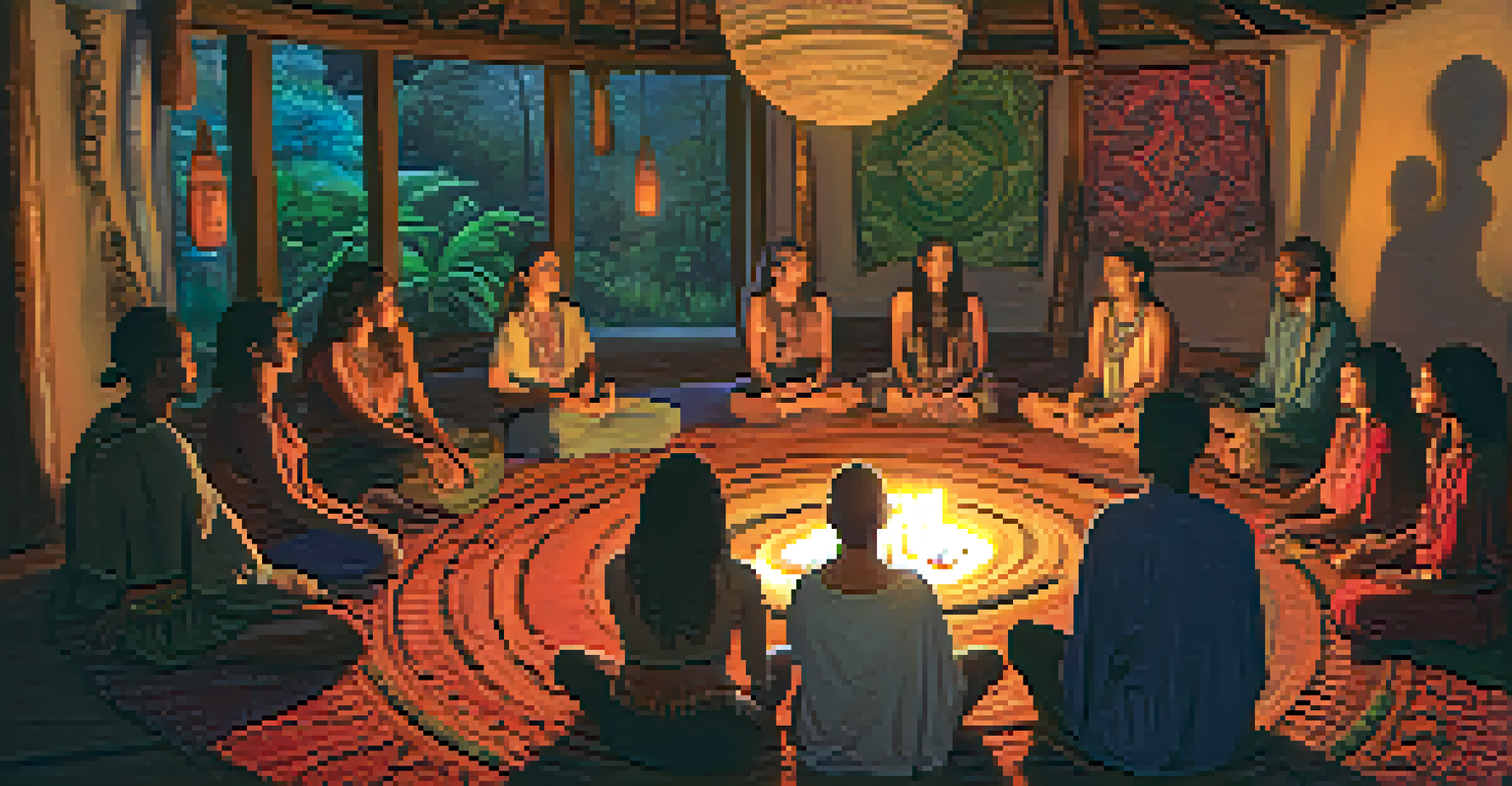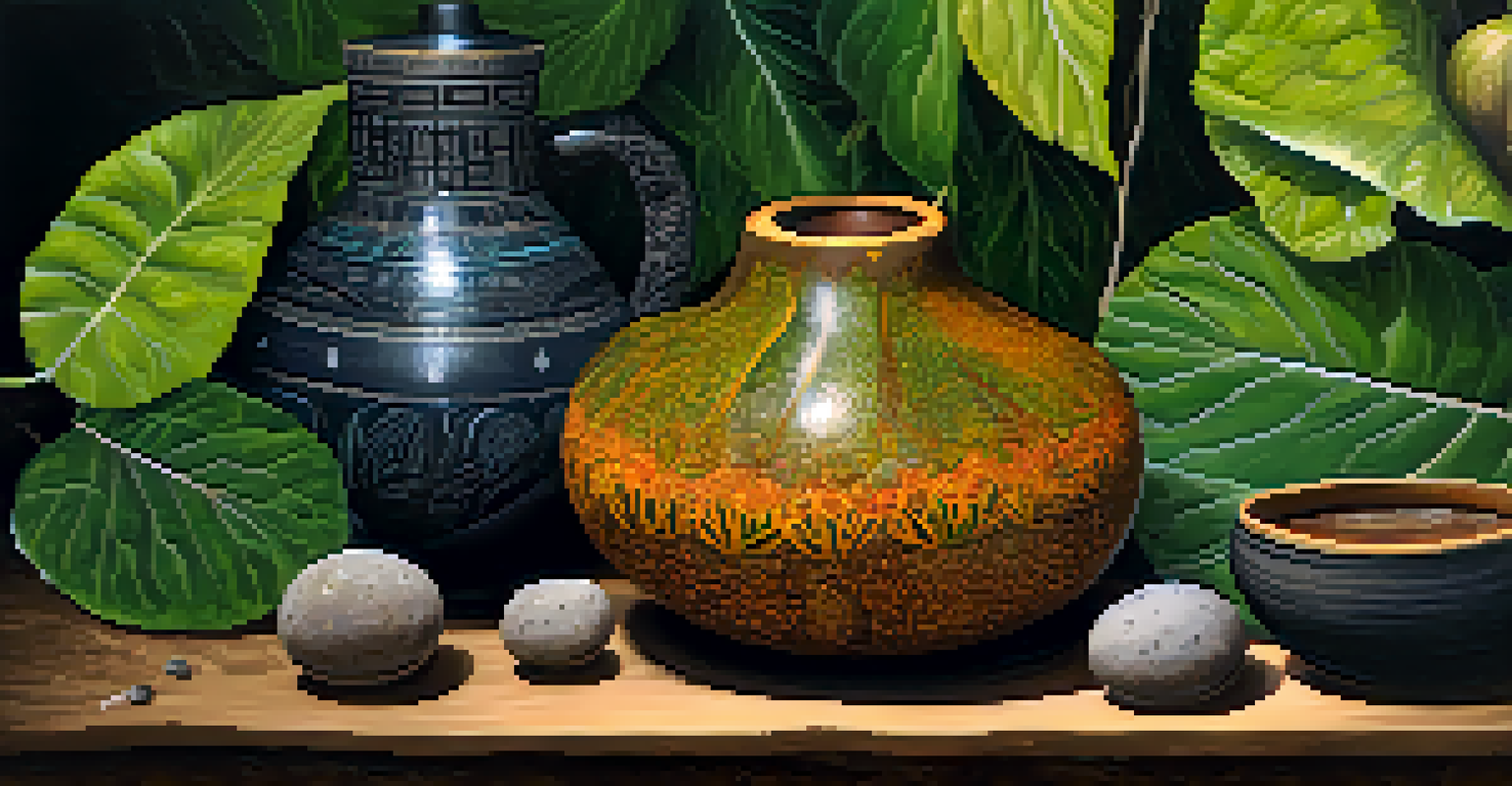Consent, Vulnerability, and Ayahuasca: Finding Ethical Balance

Understanding the Role of Consent in Ayahuasca Ceremonies
Consent is a critical foundation for any therapeutic process, especially in ayahuasca ceremonies. Participants must clearly understand what they are consenting to, including the potential emotional and psychological effects of the experience. This ensures that they feel safe and empowered to participate fully in the ceremony.
The journey of self-discovery and healing often requires us to embrace vulnerability and seek support from others.
In many cases, consent is not just a one-time agreement but an ongoing dialogue. It's essential for facilitators to create an environment where participants can freely express their boundaries and comfort levels. This ongoing communication fosters trust, which is vital for a vulnerable experience like ayahuasca.
Moreover, informed consent means that participants should be educated about the ayahuasca experience, including its potential risks and benefits. By providing thorough information, facilitators can help participants make choices that resonate with their personal values and mental health needs.
Exploring Vulnerability in Ayahuasca Journeys
Vulnerability is an integral part of the ayahuasca experience, as it often brings up deep-seated emotions and traumas. While this can lead to profound healing, it also requires a strong support system and ethical considerations. Understanding this balance is crucial for both participants and facilitators.

When individuals open themselves up to such profound emotional exploration, they must be met with empathy and care. Facilitators hold a significant responsibility to guide participants through these vulnerable moments, ensuring that they feel supported throughout their journey. This relationship can significantly influence the outcome of the experience.
Consent is Key in Ayahuasca Ceremonies
Informed consent and ongoing communication are essential for participants to feel safe and empowered during ayahuasca experiences.
Creating an environment that honors vulnerability means acknowledging the courage it takes to confront difficult feelings. Facilitators should foster a space where participants can express their fears and anxieties without judgment, ultimately contributing to a more authentic and healing experience.
Ethical Considerations for Facilitators
Facilitators of ayahuasca ceremonies carry an ethical duty to prioritize the well-being of participants. This involves establishing clear guidelines and ethical standards that govern their practices. Ethical considerations should include how to handle emotional distress and ensuring the safety of participants throughout the process.
Cultural sensitivity is not just about respect; it's about understanding the roots of practices and honoring the traditions that shape them.
Moreover, facilitators must be aware of their own biases and potential power dynamics at play. Being mindful of these aspects can help in creating an equitable environment where participants feel valued and heard. This approach helps mitigate the risks of exploitation or coercion during such vulnerable moments.
It’s also vital for facilitators to engage in continuous education about the cultural and psychological aspects of ayahuasca use. This ongoing learning allows them to better serve participants and navigate ethical dilemmas that may arise during ceremonies.
The Importance of a Supportive Community
A supportive community plays a significant role in the ayahuasca journey, as it provides a network of care before, during, and after the experience. This communal aspect helps participants feel less isolated in their vulnerabilities, promoting a sense of belonging. Such a network can also serve as a resource for sharing experiences and coping strategies.
Community support can be particularly beneficial during the integration phase, where individuals process their experiences. Engaging in group discussions or sharing circles allows participants to reflect on their insights in a nurturing environment. This shared experience can enhance the overall healing process.
Supportive Communities Enhance Healing
A strong community network provides vital emotional support, helping participants feel less isolated and aiding in the integration of their experiences.
Furthermore, building a supportive community encourages accountability among participants and facilitators alike. When individuals feel connected to others, they are more likely to communicate their needs and boundaries effectively, ensuring that consent and vulnerability are respected throughout the journey.
Navigating Cultural Sensitivity in Ayahuasca Practices
Cultural sensitivity is paramount when approaching ayahuasca practices, which are rooted in indigenous traditions. Understanding the cultural context can help participants appreciate the ceremonial significance of ayahuasca. This awareness fosters respect for the traditions and the people who have historically used these practices for healing.
Facilitators should strive to honor and incorporate indigenous wisdom in their ceremonies without appropriating or commodifying these practices. Building relationships with indigenous communities can provide valuable insights and enhance the ethical integrity of the ceremonies. This collaboration can also contribute to more authentic and respectful experiences.
Ultimately, navigating cultural sensitivity involves a commitment to learning and adapting practices in ways that honor their origins. This respect not only enriches the experience for participants but also helps in preserving the cultural heritage associated with ayahuasca.
Understanding the Psychological Impacts of Ayahuasca
The psychological impacts of ayahuasca can be profound, leading to both positive transformations and potential challenges. Participants may encounter long-buried emotions or confront personal traumas, which can lead to significant breakthroughs. However, without proper support, these experiences can also feel overwhelming.
It is essential for participants to be prepared for the emotional rollercoaster that can accompany an ayahuasca journey. Engaging in pre-ceremony preparation and post-ceremony integration can help mitigate adverse effects. This proactive approach ensures that individuals have the tools they need to navigate their experiences safely.
Cultural Sensitivity in Practices Matters
Understanding and respecting the indigenous roots of ayahuasca practices is crucial for ethical facilitation and preserving cultural heritage.
Facilitators can play a crucial role in this process by providing resources and support for psychological well-being. They should be trained to recognize signs of distress and know how to address them effectively. This level of preparedness can help create a safer and more supportive environment for all involved.
The Path to Ethical Ayahuasca Practices
Creating an ethical framework for ayahuasca practices involves ongoing dialogue and reflection among all stakeholders. This includes participants, facilitators, and indigenous communities who have historically held the knowledge of these ceremonies. By engaging in collaborative discussions, everyone can contribute to a more balanced approach to consent and vulnerability.
It is also vital to share experiences and learn from both successes and failures in navigating these ethical waters. This collective learning can pave the way for more responsible practices that prioritize the well-being of participants. Transparency and accountability should be at the heart of these efforts.

Ultimately, ethical ayahuasca practices require a commitment to continuous improvement and respect for the complexities involved. By fostering an environment of trust, understanding, and support, we can ensure that the transformative power of ayahuasca is utilized responsibly and ethically.